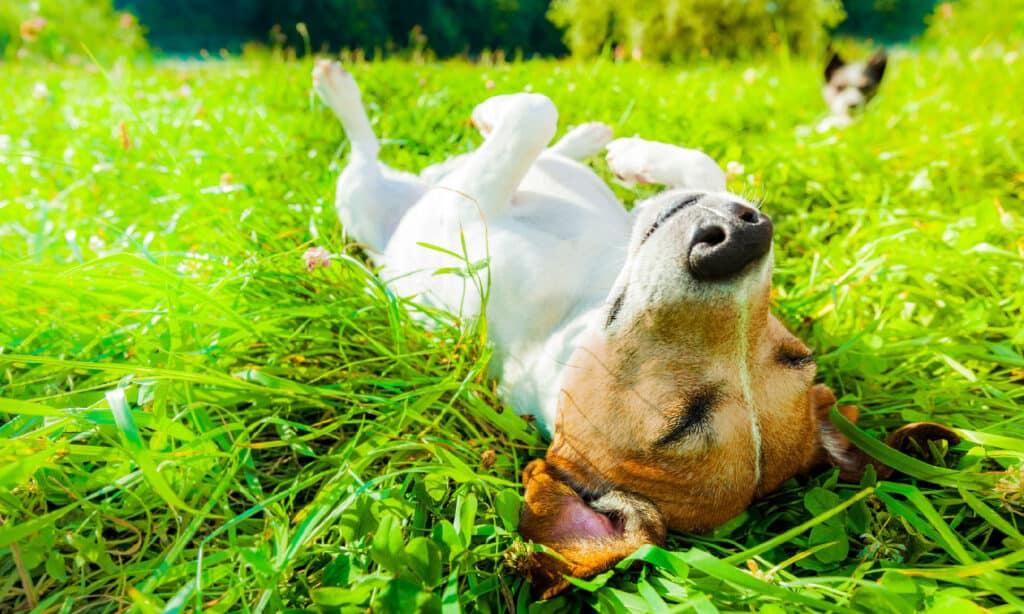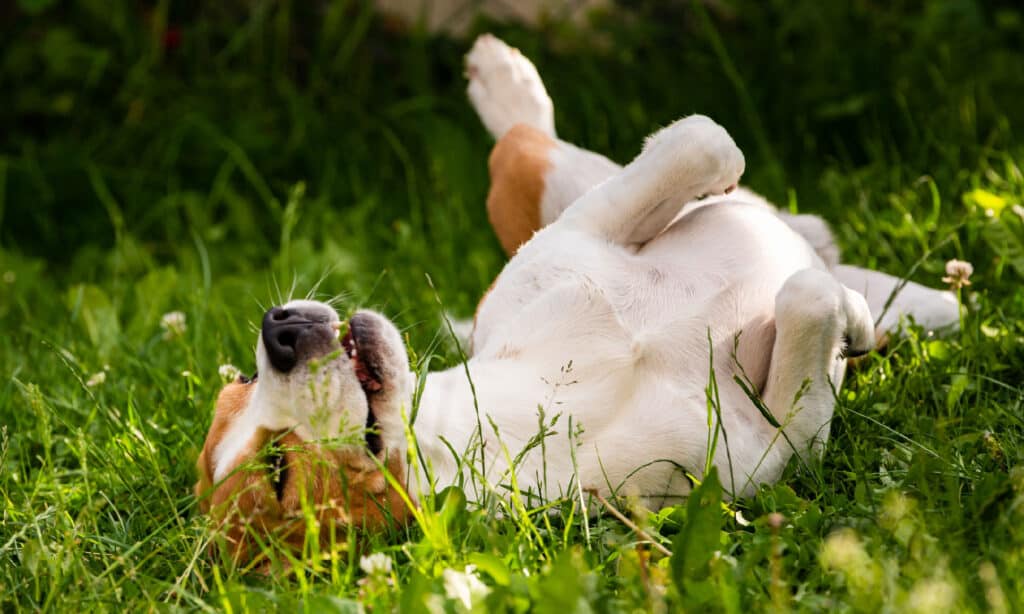Eating grass is a common behavior for many of our beloved dogs. Some dogs will snack on grass at any chance they get, while others only participate in grass eating when they have an upset stomach. The mystery surrounding a dog’s grass eating habits has been a hot topic for years, and it has led to the most common question that veterinarians are asked – Why does my dog eat grass?
We’re here to answer your questions once and for all, and introduce you to the many reasons why our canine friends like to eat grass. Ranging from simply loving the texture to an underlying disorder known as pica, let’s discuss it all!
Do Dogs Need Grass in Their Diet?

Many dogs like to snack on grass from time to time.
©iStock.com/damedeeso
Before we dive into the details of why some dogs like to eat grass, we should first answer the question of whether or not dogs need grass in their diet. Many rumors surrounding the topic have claimed that dogs need the fiber that grass offers to maintain a healthy gut, but this is not entirely true.
This belief likely stems from the fact that grass was one of the main sources of fiber for our dog’s wild ancestors. Studies show that up to 47% of wolves have plant material in their stool, proving just how long canine grass eating has been around. However, it’s important to keep in mind that wild dogs and wolves do not have well a balanced kibble to rely on each day, so they often need to turn to more natural sources of fiber to keep them regular.
If your dog is consuming a well-balanced diet each day, then they do not have to rely on grass to get their daily fiber. Dogs do need daily fiber to promote optimal gut health, but a veterinary approved diet should offer them everything they need to thrive. A small amount of extra fiber from vegetation will not harm our canine friends, but they do not have to rely on it.
If you would like some helping in choosing a high quality diet for your canine friend, then take a look at our detailed dog food guide!
Do Dogs Eat Grass To Soothe An Upset Stomach?
It’s time to answer the age old question that has stumped pet parents for years – Do dogs eat grass when they need to vomit? While this could certainly be the case for some canine friends, studies show that most dogs do not vomit after they eat grass. 75% of the dogs in the study did not vomit after eating grass, and only 10% of the grass eating pups showed signs of illness before they dove into their grass salad. Due to this study, experts no long believe that dogs only consume grass when they need to settle their stomach.
However, we should mention that some dogs with acid reflux may snack on grass in the morning if they have not eaten breakfast yet. Many dogs with gastrointestinal reflux will experience nausea in the morning due to the increased amount of acid in their stomach, and they may learn over time that eating something makes them feel better. If you notice that your pup only snacks on grass in the morning before they’ve had their breakfast, then this could be an effort to settle the effects of their stomach acid.
Why Do Dogs Like To Eat Grass?
Now that we’ve cleared up a few common misconceptions about why dogs eat grass, let’s discuss the actual reasons behind this behavior. Ranging from instinctual behavior to canine boredom, let’s dive into the details!
It Is A Natural Behavior
As we mentioned above, our dog’s wild ancestors would often eat grass to maintain their digestive health. Though or pups today no longer have to forage for their daily fiber, this ingrained need to scavenge still exists in some dogs today. Eating grass may be an instinctual behavior that some pups simply cannot ignore.
They Enjoy The Taste
While this may seem strange to you and I, some dogs love the taste and texture of grass. Grass offers a crunch that their standard diet may not have, so snacking on it can serve as a fun afternoon treat. This is also why some dogs may appear to only eat grass in certain locations, as some types of grass may be more tasty than others. You may even see their grass consumption increase in the spring, as this is when the grass is the freshest.
They Are Bored
If your dog does not have any source of outdoor entertainment, then they may eat grass to pass the time. This is especially common in dogs that spend time alone outdoors, as they are more inclined to look for ways to entertain themselves. If it seems like your pup only eats grass when they are on their own in your backyard, then this could be their way of telling you that they need more outdoor stimulation.
They Are Anxious or Stressed
Some dogs may turn to eating grass when they are feeling overwhelmed or anxious. Similar to how you and I may bite our nails when we are nervous, grass may serve as a similar crutch. This is most common in dogs that are stressed due to being left alone outdoors for long periods, but it is possible with other forms of canine stress as well.
If you think your dog is struggling with mild anxiety, you can always speak with your vet about introducing doggy CBD oil into their daily routine!
An Underlying Medical Cause
An underlying medical cause is the least common factor behind grass eating in dogs, but it is possible! This can occur when a dog develops a condition known as pica, and this causes a dog to compulsively eat non-food items or food outside of their diet. However, if this is the case for your dog, you will typically see other symptoms outside of eating grass.
A dog that is eating grass due to an underlying medical condition may experience changes in appetite, diarrhea, vomiting, lethargy, and even drastic behavioral shifts. If you do notice any of these additional symptoms in your grass eating pup, then we suggest having them assessed by your veterinarian.
Should I Let My Dog Eat Grass?

Eating grass may be an instinctual behavior that some pups simply cannot ignore.
©iStock.com/Przemysław Iciak
An occasional grass eating habit is not bad for dogs, but there are a few risks that you should be aware of. While the grass itself is not dangerous for dogs, there are dangerous items that can be found within the grass. The first potential danger to be aware of are pesticides that could be sprayed on the grass. For this reason, we do not suggest allowing your dog to snack on grass in other people’s yards, or grass in areas that are not meant to welcome the public (such as public parks or dog parks).
Another potential danger that can hide within the grass is stool from unfamiliar dogs. Many dogs get intestinal parasites from coming in contact with infected stool, and this can occur when a dog is snacking on public grass. For this reason, we suggest keeping a close eye on the grass your pup is eating in public areas, or even not allowing them to eat grass outside of your own yard.
How To Stop Grass Eating In Dogs
As we mentioned above, there are many reasons why dogs would choose to chow on grass. The best way to address this behavior is to provide an alternative or solution to each of the reasons we discussed.
If you find that your dog’s diet is lacking in vital fiber or nutrients, then you can switch to better dog food that meets all of their needs. Just be sure to speak with your veterinarian about your concerns when it comes to nutrition, as they can always guide you in the best direction for your pup’s dietary needs.
If you think your dog is lonely for any reason, you can try to set aside more quality time to spend with your pup. This can include implementing daily walks and play sessions, or any other activities that your dog enjoys. You can also consider introducing your pup to other canine friends in a controlled setting.
If you feel like your dog is eating grass due to an underlying medical condition or severe anxiety, then we suggesting reaching out to your veterinarian for guidance on what to do next. These issues can be challenging to tackle on your own, so skilled guidance is always best.
Final Thoughts
As you can see, grass eating in dogs is not just a solution for their upset stomach. It is much more likely that your dog is eating grass due to simply enjoying the taste, or that they are struggling with a case of boredom. Once you review the information we discussed above about dogs that eat grass, you can have a better understanding of your pup’s snacking habits moving forward!
The photo featured at the top of this post is © Melounix/Shutterstock.com
Ready to discover the top 10 cutest dog breeds in the entire world?
How about the fastest dogs, the largest dogs and those that are -- quite frankly -- just the kindest dogs on the planet? Each day, AZ Animals sends out lists just like this to our thousands of email subscribers. And the best part? It's FREE. Join today by entering your email below.
Thank you for reading! Have some feedback for us? Contact the AZ Animals editorial team.







